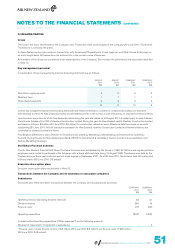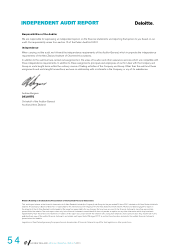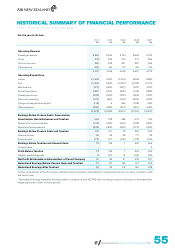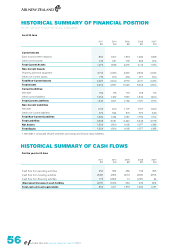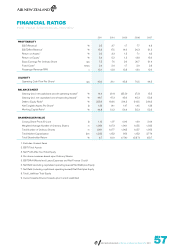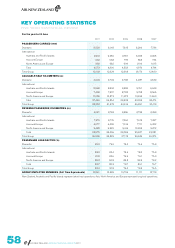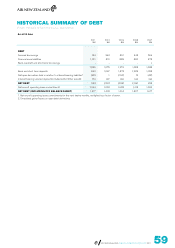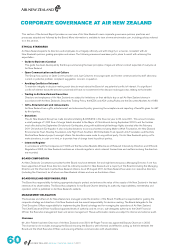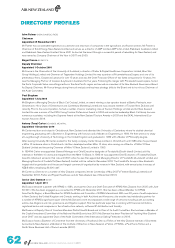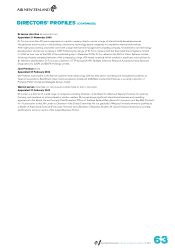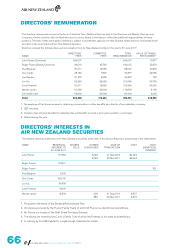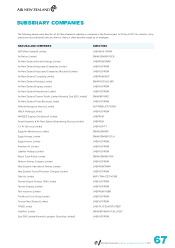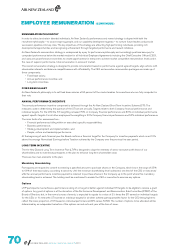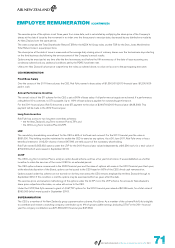Air New Zealand 2011 Annual Report Download - page 63
Download and view the complete annual report
Please find page 63 of the 2011 Air New Zealand annual report below. You can navigate through the pages in the report by either clicking on the pages listed below, or by using the keyword search tool below to find specific information within the annual report.
Director Independence
The Board’s standards for determining the independence of a director including the requirements of the NZSX Listing Rules and the
ASX Recommendations are set out in full in the Board’s Charter. All seven of Air New Zealand’s directors, including the Chairman, are
independent directors under those criteria. Directors are required to inform the Board of all relevant information which may affect their
independence.
BOARD COMMITTEES
The Board has delegated certain of its responsibilities to the Audit Committee, the Safety Committee and the People Development and
Remuneration Committee. The committees play the following roles:
• The Audit Committee assists the Board in discharging its responsibilities in relation to the financial reporting, compliance
and risk management practices of Air New Zealand.
• The People Development and Remuneration Committee monitors issues related to the management structure and
remuneration of the Chief Executive Officer and other senior executives.
• The Safety Committee ensures that, at all times, Air New Zealand has workable systems and processes in place to provide
the best practicable safety, security and environmental performance.
REPORTING AND DISCLOSURE
Air New Zealand has written policies and procedures in place to keep investors and staff informed of all material information about
Air New Zealand and to ensure compliance with disclosure requirements under legislation and stock exchange listing rules. Board and
Committee charters and policies of public relevance are published on Air New Zealand’s web site at www.airnzinvestor.com.
REMUNERATION AND PERFORMANCE EVALUATION
Executives
Air New Zealand’s performance management system applies to the executive management group. The focus is on establishing goals,
measures and targets linked directly to the business plan and to the leadership behaviours needed to achieve business success.
Air New Zealand’s remuneration policies and practices are linked directly to the performance and development processes so that
executive managers’ achievement of Air New Zealand’s goals is appropriately recognised and rewarded.
Non-executive Directors
Air New Zealand’s non-executive directors do not participate in any executive remuneration scheme or employee share schemes; nor do
they receive options, bonus payments or any incentive-based remuneration. Directors are entitled to be reimbursed by Air New Zealand
for reasonable travelling, accommodation and other expenses they may incur whilst travelling to or from meetings of the directors or
committees.
Board Evaluation
The Board has included in its Charter a requirement to conduct an annual performance review of the Board as a whole after the
financial year end. Individual director views and the views of members of the senior management team are sought on Board process,
efficiency, and effectiveness, and are discussed by the Board as a whole. In conjunction with this process, those directors retiring
annually by rotation who are standing for re-election have their performance evaluated by their fellow directors in a process co-ordinated
by the Chairman, with individual feedback to each director as their evaluation is completed.
DIFFERENCES IN PRACTICE TO NZX CODE AND ASX RECOMMENDATIONS
Under the NZSX and ASX Listing Rules, Air New Zealand is required to disclose in this annual report the extent to which its corporate
governance practices materially differ from the principles set out in the NZX Code and the ASX Recommendations. A summary of
Air New Zealand’s corporate governance practices have been provided above. Any divergence from the NZX Code and the ASX
Recommendations is explained in the table below.
ASX Corporate Governance Council Best
Practice Recommendations
NZX Corporate Governance Best
Practice Code
Reason for not following
2.4 The board should establish a nomination
committee.
2.2 Unless constrained by size, an
Issuer should establish a nomination
committee as recommended below in
paragraph 3.10.
3.10 – 3.12 Composition, charter and
review of nomination committee.
The Board believes that a nomination
committee is not required for
Air New Zealand, as its whole Board
should be (and is) involved in the
selection and appointment process
of any new Board members.
CORPORATE GOVERNANCE AT AIR NEW ZEALAND
(CONTINUED)
AIR NEW ZEALAND ANNUAL FINANCIAL RESULTS 2011


